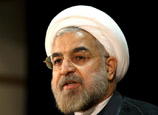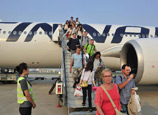
LOUGH ERNE, United Kingdom, June 16 (Xinhua) -- Presidents and prime ministers from eight of the world's powerful nations gather for their annual summit this week in Enniskillen, Northern Ireland.
The United Kingdom holds the presidency this year, and per practice has set the agenda, which will include mutual priorities on trade, transparency and taxes as well as issues of security.
"Fairer taxes, greater transparency and freer trade is an ambitious, practical and pro-business agenda that benefits everyone in the developed and developing worlds," said British Foreign and Commonwealth Office spokesperson Michael Bownas. "These issues are essential in shaping the rules which characterize a fair and open the global economy."
In an article penned for the Wall Street Journal last month, British Prime Minister David Cameron stressed the importance of global tax reporting which would allow tax collectors and law enforcement find out who really owns and controls each company.
Britain leads the charge on the clamp down on internationally renowned tax havens which fall under Britain's overseas territories and dominions, including the Cayman Islands which made headlines last year when U.S. presidential challenger Mitt Romney reportedly has over 30 million tax free dollars siphoned off.
On this front, Cameron will be able to bring his 11th hour success in securing agreement yesterday from British tax havens including the British Virgin Islands and Burmuda, who will be a series of actions aimed at increasing transparency and providing information to other tax jurisdictions.
"It is important we are getting our house in order," Cameron said. "What the Crown dependencies, places like Jersey and the Isle of Man, and the overseas territories, places like the Cayman Islands, have signed up to is basically the existing and the new standards for exchanging tax information."
These territories have agreed to trial an international pilot program that enables the automatic exchange of information between tax jurisdictions as well as abiding by the Organization for Economic Co-operation and Development's (OECD) convention on mutual assistance on tax.
The proposed plan would make UK-registered companies legally obliged to provide information on the ultimate owner who benefits from the company to British authorities, though the information would not be made available to the public.
"Personally, I would hope the whole world will move towards public registers of beneficial ownership," Cameron said.
France and Italy are also thought to back the proposal. And though similar legislation has repeatedly been rejected in the United States, the U.S. Treasury Department estimated in 2005 that as much as 18 billion dollars in suspicious transactions were made using international wire transfers that used shell companies in the United States.
Transparency would also help to uncover links to international terrorism. In the aftermath of the protests in the Arab world in 2011, it was found that some of the region's rulers had safeguarded their plundered wealth through these intricate accounting practices in Western tax havens, which gave these practices an air of legitimacy.
In addition to greater transparency, calls to reform existing tax treaties have also been making international headlines. Existing tax treaties are outdated with the emergence of new cross-border business models such as internet commerce, and the trade in intellectual property.
European leaders are expected to launch talks with U.S. President Barack Obama at the summit for what may potentially become the world's largest Free Trade Agreement.
However, on the eve of the summit, the French have successfully lobbied against cultural industries such as film, television and online entertainment from being included in any such treaty with the United States, a move that could potentially derail trade talks at the summit.
Despite the fanfare given to these issues, how much can be truly accomplished by the G8 Summit?
Detractors have pointed out that the clout of this elite group of self-appointed world powers is in decline. Each of the represented nations continues to struggle with domestic economic woes at home, while other countries and regions such as those represented in the G20 have been gaining in growth and power. No treaties are signed at this annual summit, and very little can truly be accomplished in the year before they meet again. Some question whether the G8 is an ineffectual, taxpayer funded political photo op for these leaders.
However, others say that it is important for the leaders of these nations gather to exchange ideas, whose combined GDP last year accounted for half of the world's wealth, concentrate in less than 15 percent of the world's population.
The agenda and discussion will shine the limelight of the world's media on these topics. The conclusions the group reaches, though not bound by treaties, will unquestionably give legitimacy and priority to these issues in the global conversation for the year to come.
















 Developer razes historic Guangzhou structures
Developer razes historic Guangzhou structures


![]()
